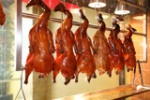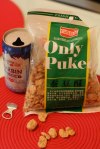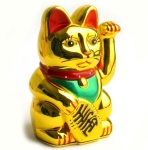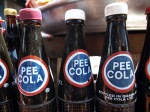by Roger White
My mother-in-law loves authentic Chinese food, so when we treat her to dinner, she almost invariably chooses First Chinese Barbecue, way up on North Lamar in far North Austin. It’s so far north you’re practically in Waco. You can’t get much more  authentic than First Chinese Barbecue; as you walk in you’re greeted by rows of dead, naked ducks hanging like John Wilkes Booth’s gang at execution. The aroma of spices and meats is practically intoxicating, and the menu’s mostly in what I presume is Chinese, with some hints about what you’re ordering in English. I’m never quite sure if I’m ingesting a pig, a chicken, or some other roasted creature, but I must say it is all quite scrumptious.
authentic than First Chinese Barbecue; as you walk in you’re greeted by rows of dead, naked ducks hanging like John Wilkes Booth’s gang at execution. The aroma of spices and meats is practically intoxicating, and the menu’s mostly in what I presume is Chinese, with some hints about what you’re ordering in English. I’m never quite sure if I’m ingesting a pig, a chicken, or some other roasted creature, but I must say it is all quite scrumptious.
No, First Chinese Barbecue did not cut some sort of free-meal deal with me to write this, but I will tell you that the dried fresh squid with black bean sauce is out of this world. (Is that good, Mr. Run?) Again, that’s First Chinese Barbecue. Far North Lamar. Ask for the Oldspouse Special.
Anyway, the dinner is only half of the evening for our Bubbie. Dear mom-in-law then likes to head next door to the MT Supermarket. This store, if you’ve never been, is the Asian version of a Walmart Supercenter. It’s a 100,000-square-foot bastion of the most amazing and unbelievable foodstuffs any Texan has ever seen. I presume these  items are foodstuffs. In this era of PC politeness and easily hurt feelings, I’m trying to tread lightly here, OK, but not in my wildest imagination can I conjure a gastronomical use for, say, pork rectum, pork uterus, or fresh chicken feet.
items are foodstuffs. In this era of PC politeness and easily hurt feelings, I’m trying to tread lightly here, OK, but not in my wildest imagination can I conjure a gastronomical use for, say, pork rectum, pork uterus, or fresh chicken feet.
And on just about every aisle you’ll find small armies of robotically waving ceramic cats. Quite unsure of what a robotically waving ceramic cat has to do with Asian groceries, I looked it up and found that these are actually a Japanese thing. Called maneki-neko (which sort of translates into “beckoning cat”) these oddly friendly felines are considered good luck talismans. I don’t know. I have a real cat, and whenever he starts to wave at me like that it usually indicates an impending ambush.
There are also rows upon rows of sweets, too, both prepackaged and freshly made. These aren’t your typical  candies and cakes, mind you. You have chocolate and strawberry Pocky Sticks, Green Bean Ice Bars, Purple Mochi Balls, and all sorts of squishy treats with names like Lychee Jelly Cup and Poo Poo Variety. Keeping the freshly rendered pork rectum in mind, I opted to pass on the Poo Poo Variety.
candies and cakes, mind you. You have chocolate and strawberry Pocky Sticks, Green Bean Ice Bars, Purple Mochi Balls, and all sorts of squishy treats with names like Lychee Jelly Cup and Poo Poo Variety. Keeping the freshly rendered pork rectum in mind, I opted to pass on the Poo Poo Variety.
With this less-than-appetizing terminology stuck in my cranium, I got to thinking. How many other marketing words and slogans—perfectly appropriate and appealing in their native tongue—somehow fail to translate? So I hopped on my google horse, and here’s what I found:
- It seems that the Pepsi slogan of some years back—“Come Alive!”—actually translated in a certain Chinese dialect into “Make Your Ancestors Come Out of the Grave!” That Pepsi packs a punch.
- Coors once used the motto “Turn It Loose!” to ramp up sales, but apparently this hip saying translated into “Suffer from Diarrhea!” in some Spanish markets.
 When good ol’ Coke was introduced overseas, some Chinese dialects rendered “Ke-kou-ke-la,” which was about as close to Coca-Cola as they could get, into “Bite the Wax Tadpole.” Yum.
When good ol’ Coke was introduced overseas, some Chinese dialects rendered “Ke-kou-ke-la,” which was about as close to Coca-Cola as they could get, into “Bite the Wax Tadpole.” Yum.- When Kentucky Fried Chicken made the leap across the big pond, their slogan “Finger-lickin’ Good” came through in Chinese as “Eat Your Fingers Off.” Ouch.
- The American Dairy Association, pleased with the hugely popular “Got Milk?” campaign, was flabbergasted to find when it exported the saying to Mexico, its initial translation appeared as “Are You Lactating?”
- If Green Giant brand foods wondered why their first forays into the Arab markets didn’t go as planned, it may have been that the Arabic terminology for
 “In the Valley of the Jolly, ho ho ho, Green Giant!” came across as “This is the Land of the Intimidating, uh uh uh, Green Ogre!” No Ogre Brand Peas for me, thank you.
“In the Valley of the Jolly, ho ho ho, Green Giant!” came across as “This is the Land of the Intimidating, uh uh uh, Green Ogre!” No Ogre Brand Peas for me, thank you. - Ah, and here’s a classic, from the days of the Ford Pinto. Seems that the braintrust of the Henry Ford folks couldn’t understand why they failed to move any of their hot, new Pintos in Brazil when they first put them on the market. Only after the fact did they discover that the word “pinto” is Brazilian slang for “tiny male genitals.” Yoiks. The Ford guys quickly and as discreetly as possible switched the car’s moniker in their Brazilian dealerships to Corcel, which means “Horse.”
Knowing all this—and understanding that the term in question surely means something delectable in the Asian world—I still can’t picture myself biting into anything of the Poo Poo variety.
![]() Roger White is a freelance writer living in Austin, Texas, with his lovely wife, two precocious daughters, a very fat dachshund, and a cat with Epstein-Barr. For further adventures, visit oldspouse.wordpress.com.
Roger White is a freelance writer living in Austin, Texas, with his lovely wife, two precocious daughters, a very fat dachshund, and a cat with Epstein-Barr. For further adventures, visit oldspouse.wordpress.com.


Be interesting to know how the British advertise their “Spotted Dick”, and how it got it’s name.